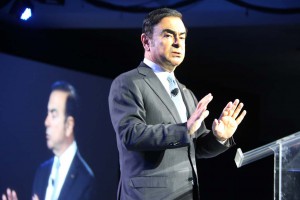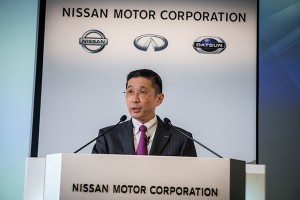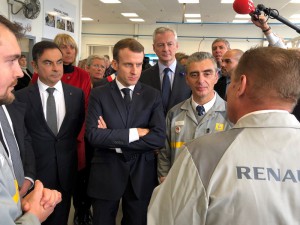
Carlos Ghosn could remain in jain for as long as 10 days. The crisis is putting a strain on the Renault-Nissan Alliance.
Carlos Ghosn, the chairman of Nissan Motor Co., could spend as much as 10 days under detention after being arrested by Japanese authorities early this week for alleged financial misdeeds, according to news reports from Tokyo.
The 64-year-old executive, long one of the most respected leaders in the global auto industry, faces the prospect of being fired this week by Nissan’s board which is set to meet at company headquarters in Yokohama. However, the board of Renault SA, the Nissan alliance partner where Ghosn served as CEO, declined to dismiss Ghosn, at least for the time being, while details of his alleged crimes have yet to be fully disclosed.
The crisis is putting a strain on the nearly two decade-old relationship between Nissan and Renault, as well as smaller Mitsubishi, the automaker in which Nissan purchased a controlling stake two years ago. Together, the three manufacturers cooperate as the Renault-Nissan-Mitsubishi Alliance coordinating everything from parts purchasing to vehicle manufacturing, though they remain independent entities.
On Monday, Ghosn and another Nissan executive, Representative Director Greg Kelly, 62, were arrested as they entered Japan. They were accused of a variety of financial crimes, Ghosn allegedly concealing about $45 million in income while also making personal use of Nissan assets. Kelly was accused of collaborating in the scheme.
(Carlos Ghosn, Renault-Nissan savior, cold bring their alliance tumbling down. Click Here for the story.)
Details of his detention have not been released though, under Japanese law, anyone suspected of a crime can be held for up to 20 days pending a formal indictment and can face interrogation during that period. When Julie Hamp, the former head of communications for Toyota Motor Corp., was arrested in July 2015 she was held for weeks in a Tokyo jail in which lights remained on at all times and detainees were not even allowed to refer to each other by name. Hamp was ultimately released without charges being filed.

Nissan President and CEO Hiroto Saikawa has been pushing for more independence from Renault in recent months.
Tokyo-based media are reporting that Ghosn could spend another 10 days under detention, even if no charges are ultimately filed. If he were indicted and subsequently convicted for the crimes prosecutors have so far outlined he could then face up to 10 years in prison and a 10 million yen, or $89,000, fine. But additional charges could also be brought against him.
Ghosn’s arrest comes as a massive fall from grace, the Brazilian-born executive once so popular that a comic book series was produced and sold as widely in Japan as the books Ghosn himself had authored.
Officials at Nissan have portrayed the revelations uncovered, they said, as a result of a whistleblower report as a betrayal. “I feel strong anger and disappointment,” Hirota Saikawa, Ghosn’s handpicked successor as Nissan CEO, said at a news conference on Monday. Saikawa is now expected to meet with Japanese authorities on a voluntary basis to discuss the case.
Since assuming the chief executive post last year, Nissan insiders tell TheDetroitBureau.com that Saikawa was pushing for a bit more independence from Renault, the French company that rescued it in 1999 with an investment of $5 billion. Renault acquired a 38.6% stake in the Japanese automaker and has since increased that to 43.4%.
The arrest of the man often credited with saving three car companies – Nissan, Renault and, most recently, Mitsubishi – is uncovering potential cracks in their profitable partnership.
(Click Here for more about Ghosn’s views of a possible Renault takeover of the Alliance.)
Ghosn not only had to deal with running a far-flung business empire but also with the political pressures associated with the Franco-Japanese group.

Alliance CEO Carlos Ghosn, left, and French President Emanuel Macron, center, tour Renault's plant in northern France. Some officials pushed Ghosn to take over Nissan.
In 2017, the French government trimmed back its holdings in Renault – partly due to maneuvering by Ghosn – to 15%. But it still holds significant sway and has been pressing to further consolidate the Paris-based automaker and Nissan, something that French Finance Minister Bruno Le Maire emphasized during a radio interview on Wednesday.
If anything, Nissan appears to be pushing for a bit more independence under Saikawa. But Reuters quoted company sources as suggesting “There is a feeling of crisis at the (Japanese) Ministry of Economy, Trade and Industry that at this rate Nissan and Mitsubishi will be seized by the French government.”
Some observers are warning that the alliance could come apart if the French press too hard – or the Japanese maneuver too aggressively to prevent a takeover.
Earlier this week, Mitsubishi CEO Osamu Masuko said the very alliance that Ghosn strung together is in jeopardy. “I don’t think there is anyone else on Earth like Ghosn who could run Renault, Nissan and Mitsubishi,” he said.
The hope among many industry observers is that cooler heads will prevail, recognizing that the Renault-Nissan-Mitsubishi Alliance is working well, and actually pushed past Volkswagen to become the number one auto group in the world in 2017, based on unit sales volumes.
(To see more about the charges against Carlos Ghosn, Click Here.)
“It’s not realistic to think the alliance will suddenly change as it is now already operating,” Masahiro Akita, an auto analyst with Credit Suisse told the Associated Press. “You can’t go back on it that easily.”
